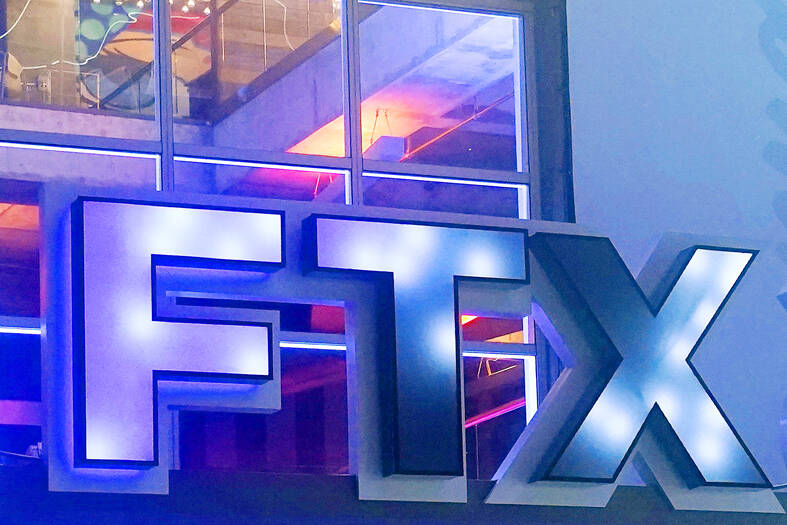Cryptocurrency lender Genesis Global Holdings Co filed for bankruptcy on Thursday, in the latest collapse since the swift downfall of FTX.
The company filed for Chapter 11 protection in the Southern District of New York, court documents show.
It plans to use the court process to try to sell assets or raise money, Genesis said in a statement, adding that if that process is unsuccessful, creditors would own the reorganized business.

Photo: AP
The company said it would use its US$150 million of cash on hand to fund itself in bankruptcy. Chapter 11 filings allow a firm to continue operating while working out a plan to repay creditors.
Parent company Digital Currency Group had been in confidential negotiations with various creditor groups amid a liquidity crunch, and Genesis had warned that it might need to file for bankruptcy if it fails to raise cash, Bloomberg News previously reported.
Genesis Global Trading and other units involved in trading and custody are not part of the bankruptcy filing.
Financial pressure at Digital Currency Group began to emerge following the collapse of hedge fund Three Arrows Capital Ltd.
Genesis suspended withdrawals in November last year, soon after crypto exchange FTX — where Genesis held some of its funds — filed for bankruptcy.
Redemptions and loan originations at the company remain suspended, and claims would be handled in bankruptcy court, the statement said.
Genesis laid off about 30 percent of its staff this month in its latest round of job cuts.
Genesis interim chief executive officer Derar Islim earlier sent a letter to clients saying it needed “additional time” to come up with a solution for a liquidity crunch at the lending unit.
Digital-asset prices weakened as crypto markets absorbed the developments. Bitcoin was little changed at US$21,000 after earlier advancing as much as 1.3 percent. The token is up 28 percent this year, paring some of last year’s deep rout.

To many, Tatu City on the outskirts of Nairobi looks like a success. The first city entirely built by a private company to be operational in east Africa, with about 25,000 people living and working there, it accounts for about two-thirds of all foreign investment in Kenya. Its low-tax status has attracted more than 100 businesses including Heineken, coffee brand Dormans, and the biggest call-center and cold-chain transport firms in the region. However, to some local politicians, Tatu City has looked more like a target for extortion. A parade of governors have demanded land worth millions of dollars in exchange

Hong Kong authorities ramped up sales of the local dollar as the greenback’s slide threatened the foreign-exchange peg. The Hong Kong Monetary Authority (HKMA) sold a record HK$60.5 billion (US$7.8 billion) of the city’s currency, according to an alert sent on its Bloomberg page yesterday in Asia, after it tested the upper end of its trading band. That added to the HK$56.1 billion of sales versus the greenback since Friday. The rapid intervention signals efforts from the city’s authorities to limit the local currency’s moves within its HK$7.75 to HK$7.85 per US dollar trading band. Heavy sales of the local dollar by

Taiwan Semiconductor Manufacturing Co’s (TSMC, 台積電) revenue jumped 48 percent last month, underscoring how electronics firms scrambled to acquire essential components before global tariffs took effect. The main chipmaker for Apple Inc and Nvidia Corp reported monthly sales of NT$349.6 billion (US$11.6 billion). That compares with the average analysts’ estimate for a 38 percent rise in second-quarter revenue. US President Donald Trump’s trade war is prompting economists to retool GDP forecasts worldwide, casting doubt over the outlook for everything from iPhone demand to computing and datacenter construction. However, TSMC — a barometer for global tech spending given its central role in the

An Indonesian animated movie is smashing regional box office records and could be set for wider success as it prepares to open beyond the Southeast Asian archipelago’s silver screens. Jumbo — a film based on the adventures of main character, Don, a large orphaned Indonesian boy facing bullying at school — last month became the highest-grossing Southeast Asian animated film, raking in more than US$8 million. Released at the end of March to coincide with the Eid holidays after the Islamic fasting month of Ramadan, the movie has hit 8 million ticket sales, the third-highest in Indonesian cinema history, Film